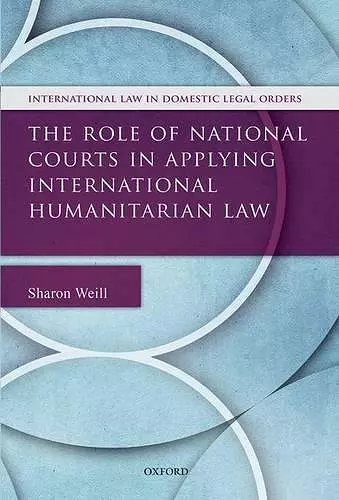The Role of National Courts in Applying International Humanitarian Law
Format:Hardback
Publisher:Oxford University Press
Published:6th Mar '14
Currently unavailable, and unfortunately no date known when it will be back

International law is increasingly applied in domestic courts. This can result in situations where the courts are being asked to rule on politically sensitive issues, especially issues which involve actions during armed conflicts. Domestic courts do not show a uniformity of approach in addressing cases concerning international humanitarian law, and can often be seen to differ markedly in their response. The book argues that different national courts demonstrate different functional roles in different countries. These can be situated on a scale from apology to utopia, which can be set out as follows: (1) the apologist role of courts, in which they serve as a legitimating agency of the state's actions; (2) the avoiding role of courts, in which they, for policy considerations, avoid exercising jurisdiction over a case; (3) The deferral role of courts, in which courts defer back to the other branches of the government the responsibility of finding an appropriate remedy (4) the normative application role of courts, in which they apply international humanitarian law as required by the rule of law; and (5) the utopian role of courts, in which they introduce moral judgments in favour of the protection of the individual, beyond the requirements of the law. The book investigates the rulings of five key domestic courts, those of the UK, the USA, Canada, Italy, and Israel, to understand how their approaches differ, and where their practice can be placed on the methological scale. This analysis has been assisted by the author's extensive field work, notably in Israel and in the Occupied Palestinian Territories. Providing a detailed understanding each court's function, the book offers a critical analysis of the courts' rulings, in which both the legal arguments and the political context of cases they have ruled on are examined. The book shows that the functional role of the national courts is a combination of contradictions and mixed attitudes, and that national courts are in the process of defining their own role as enforcing organs of international humanitarian law.
The book is thoroughly researched and unquestionably timely, and will appeal to scholars of IHL and international law, as well as those with an interest in the judicial function and the interaction of different legal regimes. Military lawyers, international and domestic judges, and the legal advisers of non-governmental and inter-governmental organizations will also be richly rewarded by reading this book. * Shane Darcy, National University of Ireland Galway, International Review of the Red Cross *
Sharon Weill pursues her aim to deconstruct and contextualize national court decisions stringently. She reveals a clear position of what courts should legitimately do when deciding in the context of armed conflicts... Thus the book is thought provoking. * Heike Krieger, German Yearbook of International Law *
This unique and important study explores the complexity of international humanitarian law when it is implemented by national courts. As Sharon Weill explains, sometimes the national judiciary acts as little more than an apologist while sometimes it makes an inspired contribution to the protection of the most vulnerable during times of armed conflict. Too often, simple or simplistic answers are presented to the problems that arise in this area, but not in this thought-provoking study. * William A. Schabas, Professor of International law, Middlesex University London *
. . .Sharon Weill's book is a timely addition to the growing academic literature on the interaction between domestic courts and international humanitarian law. . . In addition to providing an important contribution to the literature - a theoretical framework by which to better understand and assess domestic international humanitarian law cases - Weill's book has creaked opened the door for further academic study. . . Weill should be commended for her efforts. * Manuel J.Ventura, Journal of International Criminal Justice *
ISBN: 9780199685424
Dimensions: 240mm x 163mm x 22mm
Weight: 512g
242 pages